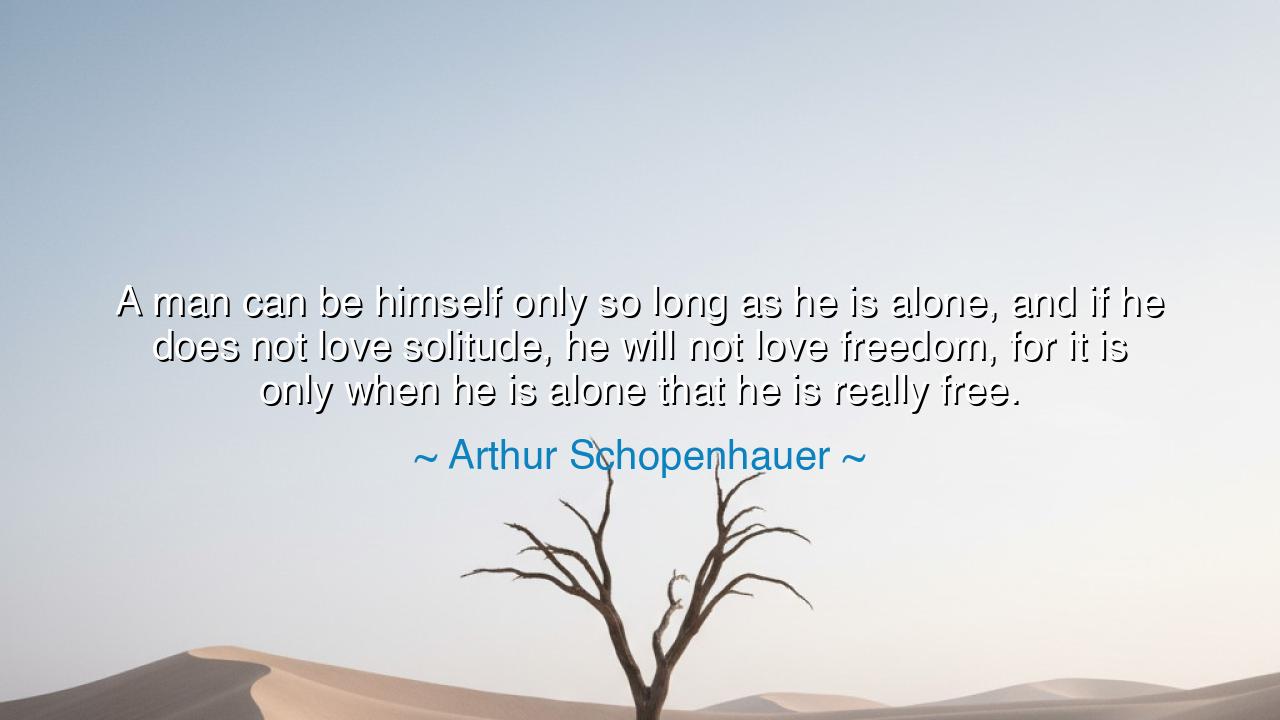
A man can be himself only so long as he is alone, and if he does
A man can be himself only so long as he is alone, and if he does not love solitude, he will not love freedom, for it is only when he is alone that he is really free.






"A man can be himself only so long as he is alone, and if he does not love solitude, he will not love freedom, for it is only when he is alone that he is really free." These words by Arthur Schopenhauer strike to the heart of the age-old tension between individuality and society. Schopenhauer, in his profound reflection, speaks to the necessity of solitude in the pursuit of true freedom. He suggests that a man can only truly discover and express his authentic self when he is alone, free from the influence of others, the expectations of society, and the constraints of conformity. Only in solitude, he argues, can we step outside the roles others wish to impose upon us and connect with the essence of our own being.
The ancients understood well the relationship between solitude and freedom. Socrates, the great philosopher, famously spent much of his life engaged in philosophical dialogues with others, yet he also valued time spent in self-reflection. For Socrates, freedom was found not in the pleasures of society but in the clarity of thought that comes from deep introspection. He famously declared, “The unexamined life is not worth living,” indicating that the true freedom to understand and shape one’s life could only be achieved in the silence of personal reflection. The freedom Socrates cherished was the freedom of the mind, and it was in solitude that the mind could escape the external distractions and engage with the deepest truths of life.
Similarly, Diogenes, the Cynic philosopher, embraced solitude as a way to reject societal norms and pursue the highest form of freedom. Diogenes famously lived in a barrel, choosing to separate himself from the comforts and distractions of society. He understood that freedom was not to be found in the accumulation of wealth or status, but in the freedom to live authentically. His choice of solitude was not a rejection of humanity but an affirmation of the power of individual will. Diogenes did not seek approval or companionship but sought only the freedom to exist as he was, unencumbered by the expectations of others.
Consider the life of Henry David Thoreau, who chose to live alone in a cabin by Walden Pond, away from the distractions of modern life. Thoreau’s experiment in solitude was not one of isolation but of self-reliance and spiritual renewal. In his time alone, Thoreau wrote extensively about the power of solitude to awaken the soul and free the individual from the expectations of society. In Walden, Thoreau states, “I went to the woods because I wished to live deliberately, to front only the essential facts of life, and see if I could not learn what it had to teach.” Thoreau, like Schopenhauer, believed that solitude was the space in which one could uncover the deepest truths of existence, and it was there that he found his own freedom.
Schopenhauer’s reflection also touches on the universal truth that many people fail to recognize: freedom is not simply the ability to act without restriction, but the ability to be oneself. How often do we find ourselves living lives that are dictated by the expectations of others, by social norms, by the constant pressure to conform? In a world that is constantly pushing us to belong, to compete, and to please, Schopenhauer reminds us that true freedom is found in solitude—in the moments when we can reclaim our authenticity and live by our own rules. It is only when we are alone that we can discover who we truly are, apart from the roles others want us to play.
The lesson here is profound: to be truly free, one must be willing to embrace solitude. Loneliness is often seen as a negative condition, but solitude—when chosen—becomes the crucible in which the self is forged. We must learn to value solitude not as an escape from the world, but as a space of personal growth and self-discovery. The more we cultivate the ability to be alone, the more we come to realize that freedom lies not in external circumstances, but in our ability to stand firm in who we are, without the influence of others. It is in this solitude that we can truly cultivate our own sense of peace, purpose, and authenticity.
In practical terms, this means that we must actively seek moments of solitude in our lives. We must set aside time for reflection, for quiet thought, and for connecting with our own hearts and minds. Whether through meditation, journaling, or simply spending time alone in nature, we must carve out spaces where we are free from the pressures and expectations of society. In doing so, we can connect with the deepest parts of ourselves, and in that connection, we find the freedom to live more fully and authentically.
In conclusion, Arthur Schopenhauer’s words remind us of a timeless truth: solitude is not only a means to an end but a necessary part of the journey to freedom. Self-reliance, authenticity, and inner peace can only be cultivated when we allow ourselves the space to reflect and grow without the interference of others. Like Socrates, Diogenes, and Thoreau, we must learn to embrace solitude, not as a source of loneliness, but as a path to true freedom. In that solitude, we reclaim our power, our purpose, and our authentic self, and in doing so, we discover the freedom that only comes when we are truly alone with our deepest truths.






AAdministratorAdministrator
Welcome, honored guests. Please leave a comment, we will respond soon